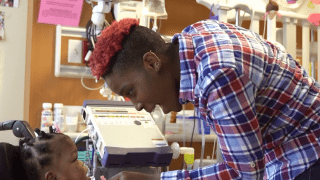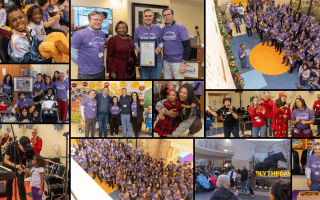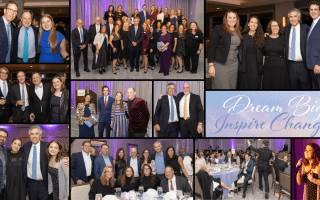I Can Do This
- A Message from President & CEO, Larry Levine

Suddenly, a tiny human being depended on you for survival. At the beginning, you’d check his breathing day and night, worry if he was feeding enough, struggle to decipher what his crying meant. But gut instinct, the advice of family and friends, some late-night research and a few panicky calls to the pediatrician pulled you through. You soon learned to understand and meet his needs; your baby grew and thrived. And you knew, “I can do this.”
But what does a parent need to know to bring home a medically complex child?
Allure weighed less than 1 ½ pounds at birth. For her first week of life, her parents could not even touch their baby, tethered to beeping machines and monitors by tubes and wires, and surrounded by bustling doctors and nurses. But Allure survived, though fragile, and was eventually admitted to our hospital.
The dedicated efforts of an extraordinary group of doctors, nurses and therapists at Blythedale enabled Allure to not just survive, but develop into a strong, spunky and alert baby. Eventually, she was ready to be discharged home—but she was still dependent on a ventilator for part of the day, and received nutrition through a feeding tube. Her daily care required her to be suctioned, her feeding tube inserted and changed, her tracheotomy opening cared for, machines calibrated, monitors checked and medicines given. Private duty nursing would be available for only part of the day. But like most parents, her mom yearned to bring her little girl home.
There was a time when Allure’s condition and her reliance on medical equipment would have meant life in a nursing home, away from her family. That time still exists in many parts of the country. But Blythedale gave Allure’s mom the knowledge, skills and confidence necessary to care for her little girl, and Allure came home. It is an opportunity all parents deserve: to learn to care for their children so their family can be reunited.
Our innovative education program divides what initially seems like an overwhelming learning curve into tiny steps. The impossible and terrifying becomes familiar and routine. From babies and children with lung, heart or neurological conditions, genetic or physical anomalies, from the preemie who has never been home to the child who has suffered an accident or medical crisis, we work to teach parents to become caregivers so their kids can come home. 91% of them do.
The key is our parent and family education team, composed of doctors, nurses, clinical educators, nurse and respiratory leaders, social workers, discharge planners and child life specialists. After an initial evaluation, the team develops an individualized education plan for each family. Many factors influence a family’s ability to master the complex care their child requires, including home conditions, family dynamics, cultural, language and educational needs and barriers, and parental anxiety. Often, parents enter traumatized, unable to see a path forward, and not yet in a condition to learn. Staff must also often contend with the multiple demands on parents’ time posed by jobs and other children at home. The team continually plans and monitors not just the child’s condition and treatment, but the parents’ educational needs and progress as well.
For many parents, the teaching process begins in our simulation lab. A safe environment away from the bedside, it is the place where tears can be shed, skills learned and mistakes made without harm. Child life specialists help desensitize parents and siblings to the sights and sounds of medical equipment. Nurses and therapists use medical dolls to teach parents how to insert tubes, to suction, and to monitor and interpret mechanical signals and physical responses of their child. Parents learn everything from how to bathe a baby with tubes attached to his body to how to manage a portable ventilator and oxygen. Teaching continues at the bedside, as techniques are demonstrated and practiced again and again. Questions are freely asked and patiently answered. Written checklists break down procedures into single steps to reinforce learning. CPR training is provided for parents and caregivers.
In the simulation lab, at bedside, and in meetings with the clinical team, competence and confidence are built. Simultaneous with learning to manage their child’s care, parents and staff celebrate each milestone their child reaches. Gradually, parents become able to again envision a future with their child: of birthday parties and schooling, visits with friends and family, walks together, trips not just to the doctor’s office, but to the mall as well. It is a childhood altered from what they expected, but a childhood nonetheless, at home, within a loving family. It is a future all children - including medically complex children—deserve.
While 24-hour nursing care would most easily bring these children home, we recognize that fiscal issues and an insufficient supply of nurses trained in home care for medically complex children make this an impossibility for most kids. We therefore call upon hospitals throughout our country to join us in allocating the funding, time and effort to make robust and thorough parent and family education a priority. Simultaneously, we call upon Medicaid managed care and insurance companies to reimburse hospitals for the increased time and cost involved in teaching parents to care for their children, a cost-effective investment which saves years of reimbursement for nursing home care.
It is essential, as well, that both Medicaid managed care and insurance companies recognize that the emotional readiness and time available for learning varies from parent to parent, as does the time needed to process new information and gain competence. Cutting off hospital reimbursement when a parent simply needs additional time to learn is a misguided and unjust decision.
The journey home for a medically complex child can at first seem impossibly bewildering and overwhelming. But an intensive education program and the efforts of a skilled and supportive team can make it possible for parents to proceed on that journey, fueled by love, courage, and the confidence, deep within themselves, that “I can do this.”



